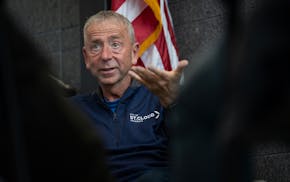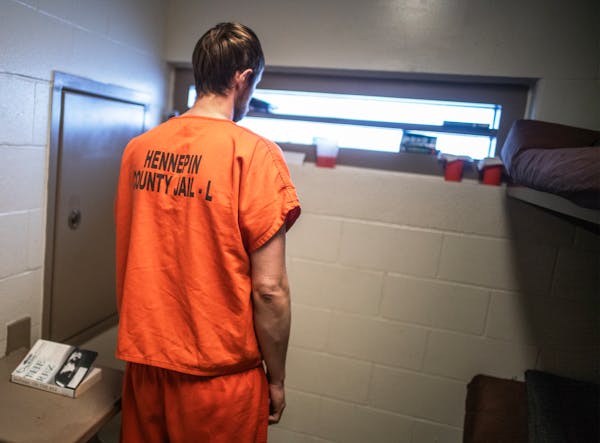Thanksgiving as a special federal holiday is in intensive care on life support. It's once-boisterous spirit has been invaded by a pernicious fever known as FCS (Frenzied Christmas Shopping).
In the worst-case scenario, the more powerful FCS microbe could fuse the two holidays together creating Thanksgivingchristmas, which could inundate all of us for an entire month.
In order to save Thanksgiving as a separate national holiday, we must carefully transport it to a better equipped month called October. There it will flourish amid the glorious red and green leaves to full recovery. Forevermore on the last Thursday of October, it will continue to be nourished and cared for by all of the people who do not have to go to work and do not have to fly through blizzards and cold and snow to be with their families.
And better yet, the Thanksgiving holiday will be more authentic, because the Pilgrims celebrated their first harvest by giving thanks in the early fall. Why can't we?
Joyce M. Gross, St. Louis Park
OIL TRAINS
Here's the truth about railroad safety
America's railroads are delivering new domestic energy supplies, powering the economic recovery and enhancing energy security. Unfortunately, the Nov. 16 Business Forum column, "Oil trains: Disasters waiting to happen," contains numerous factual errors and has misinformed your readers.
The author wrongly asserts that crude oil train routes are set independently of federal guidance. This is untrue. Railroads use the Rail Corridor Risk Management System — developed with the Department of Homeland Security, Pipeline and Hazardous Materials Safety Administration and Federal Railroad Administration (FRA) — to identify safe and secure rail routes.
Factors including population, track condition and geography are used to determine where oil trains move, and the FRA actively monitors railroads to ensure compliance. Freight railroads have done top-to-bottom safety reviews, and voluntarily adopted new standards and protocols, while cooperating with regulators weighing new rules related to how railroads move crude oil.
Claims about "secret documents" are nothing but inflammatory. Railroads work with state governments and first responders to ensure those who have a need to know about oil trains have the information they need. Railroads also have invested millions of dollars to train these responders and to develop emergency response plans across the country.
Freight rail is safely moving what powers the American economy. And every day railroads look for ways to improve an already-stellar safety record.
Patricia Reilly, Washington, D.C.
The writer is vice president of the Association of American Railroads.
• • •
The recent strong Republican voting in Greater Minnesota vs. the metro area can probably easily be understood by Democratic Sens. Amy Klobuchar and Al Franken showing total contempt for Minnesota farmers' need for adequate train transportation to get their crops to market when they voted against the Keystone XL pipeline ("Keystone narrowly defeated in Senate," Nov. 19).
Instead, they opted to bow to the wishes of President Obama, who is indebted to Warren Buffett for his generous financial backing. Buffet is the main owner of the Burlington Northern Santa Fe Railroad, which transports the oil to the refineries down south, and would be greatly impacted by the loss of revenue if the Keystone pipeline were constructed.
Who says we don't have the best government money can buy?
Jane M. Scanlon, Rochester
GEN X
Marketers ignore this group at their peril
I almost laughed out loud when I read Jackie Crosby's article on Generation X ("What about us?" Nov. 20). Talk about an epic generalization.
The Gen Xers I know are the most confident, capable adults in our society. Gen X women were Title IX girls who played competitive sports, worked hard to get educated, and filled the medical, law and business schools with up to half of their gender. Gen X men are the boys who saw their workaholic fathers on the weekends, if that, who got an education and work hard at their jobs but also change diapers, grocery shop and coach youth sports — both their sons' and daughters'. They are true partners in marriage and parenthood.
The Gen X adults have learned from corporate downsizing and massive layoffs and have become successful entrepreneurs or left corporate life for small nimble companies. They also have learned from being latchkey kids they are self-sufficient and — guess what? When they got to college, they knew how to wash their own clothes and make their own decisions.
As they have become adults, I don't hear them complaining. They are busy working, buying houses and cars, paying taxes, and sacrificing both personal time and money so their kids can be involved in sports, performing arts and any number of youth opportunities — and they are happy to do it.
If marketers are ignoring this group, then they are very shortsighted. The Gen Xers will be inheriting great wealth as we baby boomers die off, so who do the marketers think will be buying those SUVs and minivans, laundry detergent, athletic shoes and the ever-expanding array of electronics?
The Gen-Xers have had many bumps in the road, as is the case for most generations, but they have learned from these bumps and became better people for it. We baby boomers can learn a lot from them!
Sue Kephart, Minneapolis
NURSE SAFETY
Fines won't stop attacks by patients
Nurses facing unruly patients daily should be no surprise, considering the mind-sets of suffering patients and families — physical, mental and emotional ("Attacks on nurses prompt call for action," Nov. 20). Impairment to civil behavior can include dementia, drug-induced behavior, fear and pain.
Any proposal to "fine" patients for their violence seems to be a very unlikely deterrent. They are not capable of being 100 percent responsible for their actions. Medical staffs are limited in the safety programs they can implement to restrain patients from violence to themselves and others. Nurses will continue to face battle duty until the best minds develop safety programs and training compatible with patient rights and workers' compensation work environment standards.
We need to appreciate all medical workers more for accepting all these hazards and more in their daily careers in hospitals, clinics, nursing homes, rehab facilities and homes. We owe them the safest work environment possible.
Michael Tillemans, Minneapolis

Kudos to St. Cloud's longtime mayor
Readers Write: Ethnic studies curriculum, public notice laws, student protests


